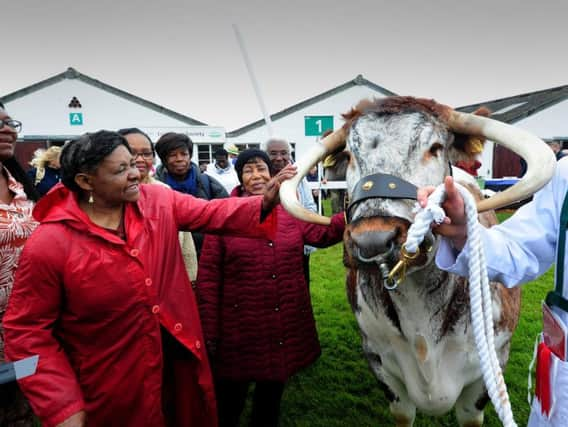Windrush women go back to their rural roots at 161st Great Yorkshire Show


Some members of the group are originally from farming communities in the Caribbean and visited the agricultural showcase in Harrogate for the first time today.
The women, all aged between 50 and 80-years-old, are part of the Sheffield and District African Caribbean Community Association (SADACCA) and despite having lived in the city for many years, have not had the opportunity to visit the show before.
Advertisement
Hide AdAdvertisement
Hide AdTheir visit, on the show's opening day, has been made possible thanks to the Sheffield Environmental Movement (SEM) charity and its projects manager, Maxwell Ayamba.
Speaking at a visit to the Cattle Ring, where the group met the Longhorn cattle competitors, Mr Ayamba said: "Most of the women here are either part of the Windrush generation or children of the Windrush who have lived in rural countryside back in the Caribbean and have come here and been severed from the natural environment.
"They have had no opportunities to come to shows like this. This is the 161st Great Yorkshire Show and this is the first time they have visited, which speaks volumes really."
Mr Ayamba said the visit was about raising awareness and providing access for people from ethnic minorities to the countryside and rural activities.
Advertisement
Hide AdAdvertisement
Hide Ad"It aims to reconnect people with their heritage and roots", he added.
Lyn Bent, who is originally from Jamaica, said she used to visit her grandma's house in the country and the show brought back happy memories.
She said: "This is the first time I've ever been close enough to a cow to stroke it and it was lovely. I wanted to take the calf home with me.
"Visits like this are very important. It's a learning experience as well. It brings back memories. There is so much here to see. We are going to take a lot back with us when we go and perhaps we will even come back next year."
Advertisement
Hide AdAdvertisement
Hide AdNerva Kidd, who moved to England from Jamaica in 1960, said her family reared chickens and goats and the visit to the show has been "a bit different".
She said: "The farming side of it reminds me of back home. It's good to get out into the countryside, I'm enjoying it."
The Windrush generation is the label given to those arriving in the UK between 1948 and 1971 from Caribbean countries.
This is a reference to the ship MV Empire Windrush, which arrived at Tilbury Docks, Essex, on June 33, 1948, bringing workers from Jamaica, Trinidad and Tobago and other islands, as a response to post-war labour shortages in the UK.
The ship carried 492 passengers - many of them children.